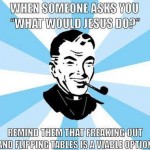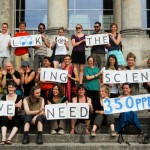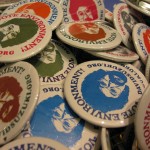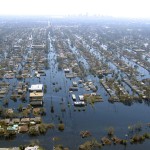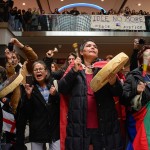From Christine Boyle, at the KAIROS Canada Intergenerational Gathering – Oct 2013
I was raised on unceded Musqueam territory. I’m a middle child, and my sisters and I were raised in the United Church. We were raised with all of the deep justice teachings of our shared traditions.
And also, we were raised to be very polite. Not just pleases and thank-you’s, but a kind of upper-middle class, white, protestant, non-disruptive politeness.
We used to do a lot of family road-trips in the summers – up to Northern BC, or to visit family in the Prairies. Always with my little sister sitting in the middle. Now, we were all taught to be polite, but we were kids too. And so sometimes out of boredom my older sister and I, sitting on either side of her, would poke, poke, poke her. Trying to get a reaction. Jaclyn was the most non-disruptive of the three of us, and my memory is that in response she would politely say something like, “I’d rather you not poke me. But I guess if you really want to, then that’s okay.”
There were lots of situations in which my older sister and I were equally meek and cautious. It’s a lesson that I have been trying to un-learn for years.
5 years ago I was in seminary, down in California, and I took a pastoral care class entitled, “Compassion and Moral Repair”. Each week we were assigned a spiritual practice to live with, and reflect on. It was a twelve-week class. And in week eleven our assignment was to practice Appreciating Anger. I was living in a collective house with 7 other people at the time, so I had lots of opportunities to practice. But having been well trained in politeness, even in that situation, anger didn’t come easy.
Like any good education, my learning from that class continues to unfold. It continued to unfold for me last weekend, at a national justice gathering of the United Church, the theme of which was a reading from Mark 11. The one where Jesus arrives at the temple, casting out the money-changers and overthrowing tables.
I love this story.
Overturning Tables
The King James Bible that I inherited from family tells me that in his arriving at the Temple and reacting to the business he saw happening there, Jesus taught those present saying:
“…My house shall be called for all nations the house of prayer’? But ye have made it a den of thieves.”
I am an imperfect theologian, so I want to tell you what I heard when I heard that. I heard Jesus, firmly and resolutely, saying,
“This space is a holy place. And your business of valuing money over life is not welcome here.”
Which was striking to me, because it is what I hear people across my province and elsewhere, Indigenous and non-Indigenous, saying. I hear them saying:
“This land, this place is sacred. And we will not allow your extraction, your money-making methods of desecration here. We are not for sale.”
In response to this threat, Jesus embodied a holy and righteous anger. I was taught to be polite. Non-disruptive. Yet when I hear this story, when I read the news, I wonder, how am I to react?
In these climate changing times. In the presence of commitments to reconciliation, amid the ongoing repression and criminalization of Aboriginal people. In the witness of shrinking churches, weakening social fabric, demoralizing democratic structures. How are we to react? What are we being called to?
Our Current Climate Reality
It is my understanding that we are facing an existential crisis on a scale that we have not seen before.
The facts are in. Climate change is happening, and it is nearing a catastrophic tipping point.
The majority of scientists have agreed that the maximum amount of carbon dioxide our atmosphere can sustain for any length of time, with any hope of sustaining human life, is 350 ppm. We are currently at 392 ppm, and it is increasing, rather than decreasing.
We don’t know exactly how much time we have. Except that every time the Intergovernmental Panel on Climate Change produces a report, they find that we have less time than they had previously thought. And every time, it’s within my lifetime. We need to change course, to do a U-turn and begin reducing the carbon dioxide in our air, within my lifetime.
System Change not Climate Change
I’ve been thinking and talking about the environment since I was a teenager. But I wasn’t always so concerned about climate change. I grew up here on unceded Coast Salish territory, and had a very physical, tactile relationship with the land around me.
I remember when David Suzuki started talking about the top 10 things you can do for the planet. They were pretty easy little lifestyle changes – recycling, buying organic, using cloth grocery bags, driving less, ect. These things are the secular, ecological equivalent of “private, personal salvation.” Do your part. Save yourself.
This past summer I got to hear eco-theologian Joanna Macy speak, and one of the things she said was:
“there are a lot of nice people who are tending their gardens, and caring for their children, and trying to do their part. But they are caught up in this broken, toxic system, this late-stage capitalism, in which these individual efforts are insufficient in challenging and changing the system.”
I think she’s right. In fact, even David Suzuki is no longer suggesting that these individual consumer and lifestyle choices, these private acts of salvation, are going to solve the problem. Not fast enough. Increasingly, we have realized that we need major systemic change.
I only recently began to understand the urgency of it all, as I started to see pictures and hear stories of areas of the world already being impacted by climate change. Rising sea levels, drought causing increased wildfires, and storms at a strength and frequency not seen before.
I realized the urgency because thus far the people most impacted by these disasters have been poor folks, the world over. And because in Canada the communities most impacted have been Indigenous communities, already devastated by an atrocious history of colonization and of Residential Schools. And I realized the urgency when I began to imagine the world that my children and their children would be growing up in.
Collective Liberation
I have been trained to think about everything theologically. And climate change, I think, is the greatest theological challenge of our time. It is our role as people of faith to be part of naming the challenge, and to take bold and courageous leadership in addressing it.
When I was growing up in the church we talked boldly about injustice, but we didn’t speak much about the environment. Now we do, a little more. But we speak very politely. Rather than challenging power, we speak about consumer choices – recycling, and green sanctuaries, and community gardens. We speak about doing the easier things, the low-hanging-fruit.
These are good. But they aren’t enough. As people of faith, we need to be thinking bigger, more systemically. We need to be organizing and pushing within each of our individual institutions, and we need to be playing to win.
Fortunately, we are not alone. Across the globe people are finding their voices, and speaking up against an economic and political system that diminishes them to mere consumers in a soul-less market. More than that, they are speaking up in favour of alternatives that put the planet and it’s people before profit.
Theologically speaking, people are challenging this notion of private salvation. And in its place they are preaching the gospel of collective liberation.
It sounds a lot like what I was taught in church sanctuaries, camps and youth retreats. And these folks are preaching it with their hands and their feet, with strategic eloquence and passionate anger, all over the place:
The Occupy movement. The Maple Spring. The youth activist Dream Defenders in the southern United States. The Uts’am/Witness Project on unceded Squamish Territory. The Vancouver-based Kids for Climate Justice. The Yinka Dene Alliance. Communities defending the land in New Brunswick. Anti-tar-sands activists. 350.org groups. And Idle No More.
We are not alone. And we should draw strength from these groups, as we too step up our game.
Now, I think you know this. And I think you’re in. You’ve been on the front lines, pushing with all your might, for some time now. Some of you were raising your voices against the Vietnam war, against nuclear proliferation, against the military use of force during the Oka crisis. Many of you have been in this centuries old struggle to heal and repair the world for much longer than I. And it is an honour to be in your company.
I want to honour that we have been fighting the good fight for some time, and that at times we may feel weary and worn. I want to honour that we are here to be among one another, and to feel rejuvenated by that. And then I want to push us a little more.
The tasks ahead are enormous: We need to stop funding and publically subsidizing the oil and gas industry, and instead invest in alternatives – alternative energies, public transportation. We need to build new nation-to-nation relationships with Aboriginal communities, relationships that recognize their land and title rights, and that respect their sovereignty. We need fairer taxation, to address what is right now an unquestionably unjust level of economic inequality, so that people are capable of making more environmentally friendly lifestyle choices. And we need to get big money and corporate interests out of our media and our democracy, so that people really can feel like their voice matters, and they have a say.
These are David and Goliath types of battles. Which is to say, biblically, that they are winnable. But probably not through conventional means.
“The Right Kind of Trouble”
I’ve been really heartened lately by the grassroots resistance and civil disobedience in opposition to the proposed Northern Gateway Pipeline, and the Keystone XL pipeline, hydraulic fracturing, and the expansion of the Alberta tar sands, among many other issues.
In 2011 over 1,000 people were arrested in front of the White House, in coordinated acts of civil disobedience drawing attention to the carbon bomb that is the tar sands. Led by an organization called 350.org, and by Bill McKibben, an author, and Methodist Sunday School teacher. And many of those arrested were there because of their faith.
In our trained politeness, our non-disruptiveness, civil disobedience can feel uncomfortable. But at this point, not standing up, not disrupting the system as it is, means supporting the status quo. And the status quo is immoral.
The Yinka Dene Alliance, and the now over 130 First Nations who have signed the Save the Fraser Declaration have stood up too. They have formed an unbreakable wall of opposition to the Enbridge pipeline and other similar tar sands projects. And they have been clear that they will stand in the way, in every way necessary. They are protecting their land, and the migration route of the Fraser salmon, and they are ensuring a future for generations to follow.
In New Brunswick, opposition to hydraulic fracturing, or fracking, for natural gas began mounting in 2010, when the provincial government handed out 1.4 million hectares of unceded land for exploration. Petitions, town hall meetings, marches on legislature slowly led to civil disobedience, as the government refused to listen. As you all know, last week the RCMP invaded a non-violent blockade, and initiated a violent conflict. But the residents of Elsipogtog have committed to continue their stand. And they have been joined by thousands of Canadians, committing to stand in solidarity, by any non-violent means necessary.
Now, of course, there is a long and honorable tradition of this. Ghandi led and engaged in civil disobedience in the name of his faith. As did Cesar Chavez, and Dorothy Day. As did Dr Martin Luther King, and much of the civil rights movement.
And Jesus engaged in civil disobedience, not just turning over tables in the temple, but challenging the unjust political and economic systems of his time. It’s pretty central to what Jesus talked about. It is pretty fundamental to the Christian story.
Fossil-Free Faith
We should all be heartened too by the growing fossil fuel divestment movement. Launched initially by student groups on university campuses, the movement has spread to municipalities, labour unions, and faith institutions. The slogan of the movement is as simple as this:
“If it is wrong to wreck the climate, then it is wrong to profit from that wreckage.”
So far 6 universities and colleges, and 18 cities have voted to divest their funds from fossil fuel companies. 16 religious institutions have voted to pursue fossil fuel divestment, including the national body of the United Church of Christ in the US. And there are over 500 active campaigns on campuses, in municipalities, and in places of faith.
The campaign is a shift for a lot of institutions who have long engaged, with varying degrees of actual effort, in shareholder activism. The shift to divestment is being done with a recognition that if fossil fuel companies, structured to prioritize profit, were to release into the atmosphere more than 20% of their current reserves, it would be game over for the planet.
Speaking about their divestment motion, Justin Whelan from Paddington Uniting Church in Australia, described it as:
“A little nudge to help them be the radical, prophetic people they want to be”.
I know civil disobedience is an uncomfortable topic. And I know there are important conversations happening right now among churches and charitable groups about what the “right kind of trouble” is.
And if civil disobedience is an uncomfortable topic, divestment may be even more so. In the churches, we are divestment weary. For many institutions, past fights over divestment have worn us down. And our institutions are facing financial trouble, with no change in sight. So we’re being fiscally cautious.
But climate change is happening. It’s worsening. Our options for action are running out. Our government isn’t budging. And the call for real action on climate could use additional moral voices. Our voices.
A Bold and Prophetic Faith
The church in my lifetime has lost its edge, and for that reason, I think, much of its credibility. Former United Church moderator Marion Best once explained it to me by saying something like:
We were devastated when stories started coming out about the Residential schools. Previously we had always seen ourselves as standing on the side of justice. Now we were implicated in the most atrocious of atrocities. And it broke us. Who were we anymore to speak for peace and justice, after what we had done?
But of course, who are we not to?
There’s a certain poetic appropriateness here, because one of the keys to successfully tackling climate change and fossil fuel development is an embracing and a true recognition of Aboriginal Rights and Title, and in so doing, making real our promise of Reconciliation.
Climate change isn’t primarily a technical or a scientific challenge. We have the knowledge and capacity to address it. It is a profoundly ethical and theological challenge, with huge moral implications. Oil dependence, and over consumption, has polluted the soul of our country, and furthered a physical and spiritual disconnect from the natural world.
As mainline Christian denominations are losing members, and losing social license, now is the time for churches and people of faith to be bold in their proclamations of what a better world could look like. Fred Small, minister of the Unitarian Universalist First Parish Church in Cambridge recently said:
“With the civil rights movement, the youth led and the churches followed. The students are leading — now it’s time for religious institutions to follow.”

